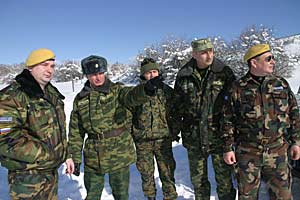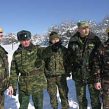
EUROPEAN UNION MISSION DEPLOYS TO GEORGIA WHILE QUESTIONS PERSIST ABOUT GENEVA TALKS
Publication: Eurasia Daily Monitor Volume: 5 Issue: 192
By:

The European Union launched the EU Monitoring Mission (EUMM) in Georgia on October 1, in a series of tightly sequenced moves to implement the French-mediated armistice in the Russia-Georgia war. The next scheduled move is Russia’s withdrawal from the unilaterally declared “security zones” outside Abkhazia and South Ossetia by October 10, to be followed by the opening of an international diplomatic process in Geneva on October 15.
This sequence proceeds in line with the August 12-15 armistice documents and September 8 addenda to them. The whole process makes clear at last the nature of this conflict: one waged by Russia against Georgia on the latter’s territory for the past 16 years, under the guise of two Russian-orchestrated conflicts within Georgia. The West had accepted this Russian pretense all along but finally rejected this excuse after Russia’s full-scale invasion of Georgia and recognition of Abkhazia’s and South Ossetia’s secessions from Georgia in August.
The EUMM is a civilian mission with an authorized strength of some 350 unarmed, uniformed observers, supported by almost all EU member countries, and tasked to move in light armored vehicles throughout Georgia’s territory. The mission’s initial duration is 12 months, but it is likely to be extended afterward. Its main goals are to verify compliance with the armistice terms, meaning in practice the withdrawal of Russian troops and “ensuring that people can return in peace to their homes,” according to the EU’s High Representative for the Common Foreign and Security Policy Javier Solana in Tbilisi at the launch of the mission (European Report, October 2; Georgia Today, October 3). The reference to the return of internally displaced people alludes to Georgians ethnically cleansed by Russian and proxy forces.
Russia will not allow the EUMM to enter Abkhazia and South Ossetia at this stage, but is using the issue of access for political bargaining. While the EU recognizes Georgia’s territorial integrity, including those two territories, Russia takes the position that the EU must negotiate with Abkhazia and South Ossetia as “independent states” for permission to deploy EUMM observers in those two territories. Moscow wants to nudge the EU into making some agreements or at least negotiating with the secessionist authorities for EUMM access there. This would signify a degree of acceptance, if not legitimization, of the two secessions. It would also risk implying an international confirmation of the demarcation lines between the two territories and the rest of Georgia.
Georgia takes the position that it would talk to the South Ossetian and Abkhaz authorities about the safe return of refugees to their homes there, as part of an international process.
Meanwhile, the Russian military is allowing the EUMM to patrol the “security zones,” occupied by Russian forces outside Abkhazia and South Ossetia. The Russians are scheduled to vacate those zones on October 10. Under the terms of the armistice, however, Russian forces are required to withdraw to the positions they held prior to August 7, that is, prior to the start of full-scale hostilities. This means the withdrawal of most Russian forces that are currently deployed in Abkhazia and South Ossetia. The Kremlin, however, has torn up the armistice document by “recognizing” the two territories as “independent” and keeping two brigade-size contingents there.
Russia will in any case block the EUMM’s access to South Ossetia for some time in order to hide the evidence of ethnic cleansing, such as burnt-down Georgian villages and the marks of systematic looting. At least one-third of South Ossetia’s population was Georgian prior to the August war. Russian forces have now carved out a depopulated glacis there for long-term deployment within easy striking distance of Tbilisi.
The course of the Geneva talks will crucially depend on the priorities, format, and procedures to be adopted in the first round, which is scheduled to open on October 15. Georgia, Russia, the United States, the European Union, the United Nations, and the OSCE are due to participate at the level of senior officials (see EDM, October 6). In that format, Russia will enjoy direct and indirect representation: in its own name as well as through the UN and OSCE, both of which operate under Russian veto power.
From Georgian and Western perspectives, the main challenge is not simply to uphold the principle of territorial integrity but to avoid the semblance of de facto acceptance of Abkhazia’s and South Ossetia’s separation, let alone their de facto annexation by Russia. These talks can not be about Abkhazia’s and South Ossetia’s political status inasmuch as their status as Georgian territories is not negotiable.
Russia wants Abkhazia and South Ossetia to be full-fledged participants as “independent states” in the Geneva talks. None of the other participants would accept such a procedure. One alternative option under consideration would include Abkhaz and South Ossetian representatives within the Russian delegation. This option could, however, inadvertently consecrate the two territories’ secession from Georgia. Keeping those representatives outside the Geneva conference hall while stressing the non-recognition of the two territories might be preferable from a Georgian and Western standpoint.




